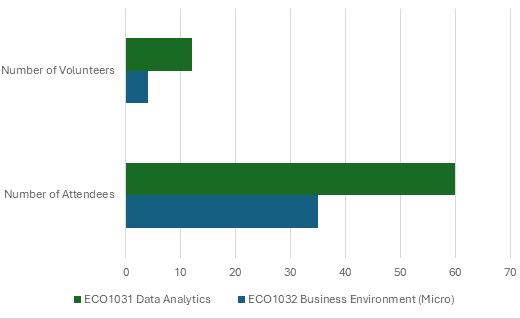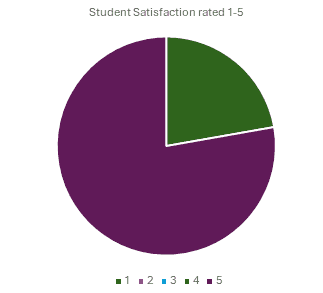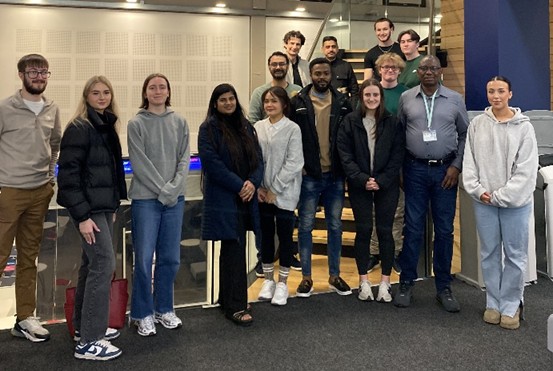Ryan Chapman, Rachel Justice & Dr Erkan Demirbas
Lincoln International Business School (LIBS)
Published April 2024
Contents
- Introduction
- Term A 2023-24: Support Sessions for ECO1032 Business Environment (Micro)
- Student Feedback: ECO1032 Business Environment (Micro)
- Term B 2023-24: Support Sessions for ECO1031 Data Analytics for Business
- Student Feedback: ECO1031 Data Analytics for Business
- Feedback from Volunteer Students
- The Future of the Support Session
- Conclusion
Introduction
The peer support project for ECO1032 Business Environment (Micro) at Lincoln International Business School (LIBS) is a student-led, student-focused initiative designed to improve the learning experience for students and ensure that those who may not have completed level 3 qualifications in subjects such as mathematics and economics are not unfairly disadvantaged when it comes to completing their business degrees.
As the module includes two Time Constrained Assessments (TCAs) focusing on specific formulas and analysis of data, we found our peers were not confident with certain formulas, especially under timed conditions leading to stress that they would underperform in the module. After we highlighted these problems raised by our peers, we set up support sessions available to everyone on the course, whether they were struggling or just wanted extra practice. We aimed to improve/ strengthen our peers' understanding and confidence with the module, so that their performance during the TCA assessments would improve.
Term A 2023-24: Support Sessions for ECO1032 Business Environment (Micro)
When we (Rachel & Ryan) first volunteered to run the support sessions for ECO1032, our aim was to primarily prepare our peers (from our seminar groups) for the upcoming TCA assignments. So our support sessions consisted of working through trial test questions and Kahoot! quizzes to recap the content expected to appear on the assignment. We also offered pizza — sponsored by the Head of the Department of Accountancy, Finance and Economics — as an incentive to increase the number of attendees.
We attended a Maths and Stats Help (MASH) training session to better understand the roles that we were taking on in the Peer Study Group and to prepare us for the support sessions. During the MASH training we went through multiple scenarios which may appear in the sessions, and we learnt how to correctly approach a student who is struggling, without being insensitive. This training session was very insightful and allowed us to be more inclusive in how we approached our peer support sessions. We understood that not everyone would be at the same academic ability level; it would be important to ensure that we explained content so that all abilities could understand.
Student Feedback: ECO1032 Business Environment (Micro)
To ensure students were benefiting from these support sessions, we used primary data from feedback forms at the end of each session. This allowed us to see which alterations we could make to support our peers further.
Table 1: Feedback from ECO1032 Test 1 Support Session
| Strongly Agree | Agree | Neutral | Disagree | Strongly Disagree | |
|---|---|---|---|---|---|
| Attending this event helped me prepare for Test 1 | 3 | 4 | 0 | 0 | 0 |
| I feel more confident now | 3 | 4 | 0 | 0 | 0 |
| Were the members of the support team effective? | 6 | 1 | 0 | 0 | 0 |
The students that attended the support session also said in their feedback:
“Everyone was very helpful, Brodi spent specific time breaking down certain questions and Ryan was constantly offering help”.
“It was useful and informative”.
‘’It met my expectations’’
From the data collected from Test 1 we were able to identify that our peers were we happy with the support session we had delivered and as a result they felt more confident with the content before sitting Test 1. Therefore, we successfully met our objective of preparing our peers for the first test, which this support session was based around, as well as contributing to the ‘One Community’ spirit since everyone involved benefitted from the session. We also discovered that students preferred a more student/teacher-led style of learning, which we took on board for our next support session.
Term B 2023-24: Support Sessions for ECO1031 Data Analytics for Business
After the success of the Peer Study Group for ECO1032, we decided to continue offering support sessions for the next mathematical based module in Term B, ECO1031 Data Analytics for Business. As Erkan is the module leader for ECO1031 we were able to raise awareness for the support group through announcements in lectures and emails sent to the whole cohort.
This increased the demand of students wanting to attend the support session, as well as the number of students volunteering to support their peers (Graph 1).
Graph 1: Demand for the Support Sessions

To meet this demand, we expanded our team of volunteer students to include third year, masters, and PhD students as well as first year students. This allowed us to further contribute to the ‘One Community’ spirit of the university as we were able to connect students from across the Business School with the common aim of helping others improve their academic performance.
For this module we offered three formal support sessions, one for each of the TCA assignments and a third for the group project assignment. The group project assignment offered a unique experience for us as its format is very different from the TCAs; application of data was more important than the calculations themselves, but the calculations also needed to be correct to provide sufficient information and accurate results to comment on. It was crucial that we could help sufficiently, as we don’t want students to feel that they cannot contribute enough to their final reports. We also changed the format of our sessions to accommodate the larger number of attendees; we did this by separating our peers into smaller groups which could be supported by two volunteer students.
Student Feedback: ECO1031 Data Analytics for Business
We conducted another feedback questionnaire for this support session, which included feedback such as:
“Very friendly and easy to understand. Helped significantly.”
“It was very helpful, relaxed and enjoyable. A fun event.”
“I would prefer to have the support in other modules as well.”
The feedback collected from the second peer group highlighted that students were again very satisfied with the support that they received (Graph 2). However, they would benefit further from peer support sessions for their other modules as well – such as finance. This supports our long-term plan of establishing a framework to grow the Peer Study Group sessions further, which will extend the ‘One Community’ spirit across the business school.
Graph 2: Students' Overall Satisfaction rate for ECO1031 Support Sessions

Feedback from Volunteer Students
We also collected verbal feedback from volunteer students to ensure that they were also benefitting from the ‘one community’ spirit and that we could implement any improvement they suggested. This feedback included:
“It was awesome, students showed great willingness to learn and improve themselves and I believe this is a very wonderful initiative to help them achieve success.”- PhD student.
“We went through all the questions provided, explaining how to approach them and answer them in excel format. Any students who required more help we went round and helped individually and ensured everyone understood how we concluded our answer to each question before moving on. We gained valuable experience of helping people and speaking in front of a class, we both enjoyed doing it and appreciated the opportunity.”- 3rd year student.
“As a member of the support team, I found the peer support sessions very rewarding as I could instantly see the differences I was making and gauge instant feedback from the students as we were helping.”- 1st year student.
“Next time as well as going through the questions in front of the class I would make time at the beginning to talk directly to students so that I could find out which questions they were struggling with and then focus more on these with the whole class.”- 1st year student.
Picture 1: Group of volunteer students

The Future of the Support Session
Looking into the future, we would like to establish a framework that can be expanded to assist more students, not only in modules which are mathematically challenging but in all modules for which students need more practise/support.
Future plans involve maintaining a strong sense of community: enticing students to attend and increasing incentives for helpers too. We feel we have developed skills which can be passed on to students joining in September and those new to the business school. Other module leaders may notice groups or individuals are struggling with specific skills and feel that schemes similar to ours can be implemented for their own courses. It is important to pursue collective growth, so we hope schemes like this can become a selling point of the university.
Conclusion
From the data we have collected, we can conclude that, as a result of our Peer Study Group, students felt more supported in their studies. This helped to improve their understanding and confidence in ECO1032 Data Analytics for Business. We also found that students would prefer to have more support across all their modules. This report has shown that our Peer Study Group significantly contributes to the University of Lincoln’s ‘One Community’ spirit by bringing together students from across the business school to help support first year students in their modules.
Although we have faced challenges with maintaining engagement as not all students are willing to attend out-of-hours sessions, we have been able to adapt to offer more group sessions on request for students who were unable to attend the planned sessions. The findings from this report also support our long-term plan of establishing a support framework for more students across the University.
↑ Top